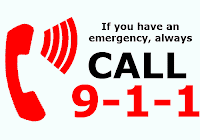 In case you come to visit the US, you might want to learn these emergency words.
In case you come to visit the US, you might want to learn these emergency words.
911 – This is the number you dial when you have an emergency. You call it for a medical, police or fire emergency. 1 number connects you to all 3 organizations.
EMS – Emergency Medical Services – This is who comes to your house if you have a medical emergency.
EMT – Emergency Medical Technician – A member of the EMS team.
Trauma – A serious injury or shock to the body.
Doc in the Box – (after-hours doctor) – This is where you go in the evening or on the weekend when your regular doctor’s office is closed, yet you are not sick enough to go to the ER
ER – Emergency Room – This is where you go if you have any kind of medical emergency. For example: if you break a leg, get a cut that needs stitches or any other thing you could imagine.
Ambulance – This is a vehicle that takes you to the ER if no one is able to take you or if your condition requires it.
Treatment – The management of a patient. This is what the doctor decides to do for you to help your condition.
Prognosis – This is a predication the doctor gives you about what he thinks the outcome will be for your disease or illness.
Triage – This is where you go to first at the ER. They take your vitals. Vitals includes, blood pressure, temperature and then they ask you questions about your problem. Triage is run by nurses. After Triage, you will be put in a room and then a doctor sees you.


